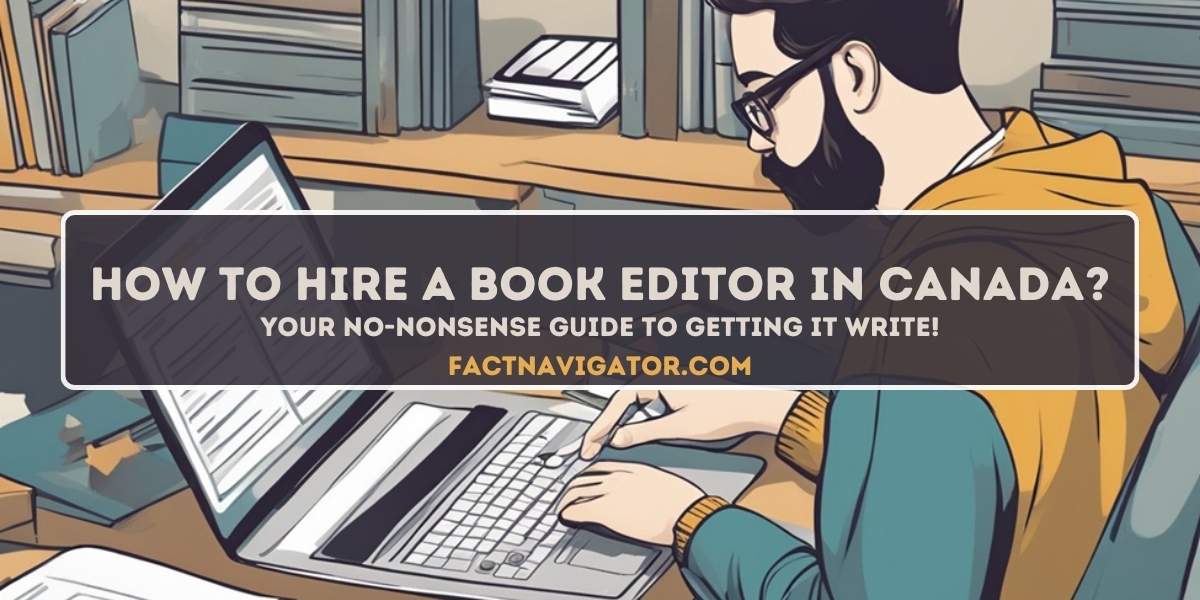How to Hire a Book Editor in Canada: Your No-Nonsense Guide to Getting it Write!

So, you’ve penned your masterpiece and are ready to take the literary world by storm—but hold your horses, Shakespeare! Before your book hits the shelves, you’re going to need a keen-eyed book editor who doesn’t just get your vision but can also dot the i’s and slash the superfluous adjectives like a ninja in a verb garden. When you hire a book editor in Canada, it’s like swiping right in the world of Canadian publishing: you want someone who’s a perfect match for your narrative voice and has the skills to make your prose pop.
In the land of maple syrup and polite apologies, finding the right Canadian book editor can be as tricky as ordering a coffee with milk, not cream, at Tim Hortons. Yet, it’s a critical step. These word wizards will help you avoid the faux pas of dangling participles and characters who change names midway through the novel. Sure, your Aunt Edna might’ve aced English Lit, but when it comes to hiring a professional book editor in Canada, you want someone who’s been around the editorial block—a pro who can balance your voice with the precision of a well-played hockey stick.
Understanding Book Editing in Canada
Before you go hunting for the perfect wordsmith to wrangle your dangling modifiers, let’s get up close and personal with what book editing in Canada entails.
Editing Basics and Differences
Alright, you literary genius, let’s crack open the editor’s toolkit. First up, we have proofreading, the frontline defense against those pesky typos and grammatical gremlins. It’s the final polish, the sweep for cobwebs before your book hits the shelves.
Moving a notch deeper, copy editing snags not just the typos but also gives your syntax a good shaking. Copy editors are your linguistic lifesavers, ensuring your sentences are smoother than a maple syrup spill on a hockey rink.
Now, if you’re feeling adventurous, developmental editing is like hiring a sherpa for your manuscript’s journey. Developmental editors look at the big picture, coaching your narrative arc from confused caterpillar to a butterfly of plot and pacing.
If you wish to get even more granular, there’s line editing. Picture this: a surgical strike on your manuscript, targeting weak prose, overused metaphors, and making your dialogue snap, crackle, and pop.
And just when you thought we were done, there’s content editing, the hybrid beast of the editing world. The content editor dives into your book’s depth, fact-checks like a trivia champ, and tightens your story without losing your voice.
Remember, your editor in Canada isn’t just a grammar guru; they’re your partner in literary crime, working tirelessly to make your words shine brighter than the Northern Lights.
The Editorial Process
Okay, let’s dish out a playbook for the editing game. Once you’ve snagged a Canadian editor, the process kicks off with a meet-and-greet—sans poutine, sadly. You’ll discuss your vision, your book’s needs, and probably the weather because, well, Canada.
Then, it’s down to brass tacks. Your chosen champion of the comma will scour your pages in waves, each with its own focus. Whether it’s nipping redundancy in the bud or questioning the plausibility of your protagonist’s pet moose, each round aims to elevate your storytelling.
A tip: keep the maple syrup handy, because patience is key. Quality editing is a marathon, not a sprint, and your manuscript is in it for the long haul. Stay receptive to feedback, and you’ll cross the finish line with a book that’s the literary equivalent of the perfect poutine: comforting, satisfying, and a little messy in just the right ways.
Finding Your Canadian Book Editor
Before you chuck your treasured manuscript over the transom and hope for the best, let’s talk shop about snagging the right Canadian book editor. You’re in the Great White North now, so let’s make sure your literary journey doesn’t end up on ice.
Editorial Expertise and Genre Specialization
When picking a book editor, genre is your golden ticket. You wouldn’t want a horror aficionado wrestling with your rom-com opus, eh? Toronto is a bustling hub with pros skilled in fiction, non-fiction, young adult, and even the not-so-scary world of eBooks.
- Fiction: Look for someone who knows their way around a plot twist and isn’t afraid of a little character development.
- Non-fiction: Find a fact-checker extraordinaire with a passion for clarity.
- Young Adult: Seek out a cool cat with a finger on the pulse of teen angst and wizard schools.
- eBooks: Can they navigate the digital jungle? You’ll want an editor who speaks hashtag as fluently as Shakespeare.
Navigating the Canadian Publishing Landscape
Canada’s literary terrain is as diverse as its wildlife, so your editor should double as a sherpa—someone who won’t get lost in the snow. They must understand the cozy igloos of self-publishing and the grand lodges of traditional publishers. An editor with a fir-tree-level knowledge of Canada’s unique cultural nuances is a must to make sure your book sings “O Canada” from every page.
- Self-Publishing: Get an editor who knows the art of doing it yourself without looking like you did it yourself.
- Traditional Publishing: Your book needs to impress, so draft someone with experience charming the moose-sized gatekeepers.
Freelance vs. In-house: Pros and Cons
Now, ponder whether you go maverick with a freelance editor or opt for the steady hands of an in-house expert. Freelancers can be like finding the Northern Lights—spectacular but can vanish in a snap. In-house might keep you snug and warm, but may also come with a price tag that’ll make you want to put on a second parka.
- Freelance Editing: Flexible, possibly budget-friendly, and come with a hint of adventure.
- In-house: Generally more expensive but hey, you get what you pay for, including someone to regularly nudge about deadlines with your most polite “sorry.”
Remember to peek into their digital den to see if ghostwriting is something they dabble in; it could haunt you later if you’re not clear up front.
You’re all set to brave the editorial wilds! Go on, find your book’s perfect Canadian match. They’re out there, waiting by the fire, with a red pen in one hand and a cup of maple syrup-laden coffee in the other. Good luck, eh!
Vetting Editors and Creating Lasting Partnerships
Before you take the plunge and hire a book editor in Canada, it’s crucial to vet potential editors to ensure they’ve got the chops for your literary masterpiece and to hash out the nitty-gritties of a partnership that’s as harmonious as maple syrup on pancakes. Let’s dive into how to spot the editorial unicorn for your book.
Essential Skills and Experience
Experience: Check the editor’s track record like you’d scrutinize a hockey player’s stats. Look for a strong portfolio with books in your genre. An editor who has worked on bestsellers might know a thing or two about hitting the mark with your audience.
- Skills: Line editing? Developmental editing? Ensure they have the right skills by looking for:
- Grammar Guru: Can they spot a comma splice from a mile away?
- Consistency Cop: Is their attention to detail better than a Mountie’s nose for trouble?
- Story Doctor: Can they provide critical feedback without crushing your authorial spirit?
Building Rapport and Effective Communication
Start your editorial relationship with open communication as if you’re building a sturdy igloo—brick by icy brick.
Get chatty:
- Discuss expectations like you’re going over the game plan during the third period.
- Are you on the same page, or is your dialogue more crossed wires than a plate of poutine?
Remember, the goal is to establish trust like you’re both seasoned curling partners calling shots in the house.
What to Include in Your Book Editor Contract
Let’s ensure your contract is as tight as a goalie’s grip:
- Timelines: Nail down deadlines like you’re claiming stakes to a hockey rink. It’s all about no surprises!
- Revisions: Specify rounds of edits like servings of Timbits—you need to know how many you get!
- Costs: Get clear on expenses. No one likes surprises, especially when it comes to loonies and toonies.
- Communication Method: Decide if you’ll chat through emails, pigeon carriers, or the occasional ‘good ol’ Canadian face-to-face apology tour’.
A well-crafted contract can turn a business transaction into a lasting bond sure to outlive the most persistent Canadian winters.
Conclusion
So, you’ve trotted all the way to the end of your book writing journey and are now ready to saddle up with an editor—well, almost. You’ve waded through the swamps of self-editing, but let’s face it, your baby could use a fresh pair of spectacles. Remember:
- Experience Counts: Like a sommelier of words, the more seasoned your editor, the finer the nuance they’ll bring out in your work. Look for editors with a track record—you don’t want your book’s fate in the hands of an intern still getting hyped over free coffee.
- Get Personal: Find someone who gets you, who reads your genre for breakfast and speaks fluent you. This editor will not only tighten your prose but do it while preserving your voice.
- Cost vs. Quality: Don’t sell your soul, but remember, you often get what you pay for. There’s a balance between reasonable rates and the kind of editing that will make your manuscript glow in the dark.
- Sample Edits: Get a taste before you feast. A sample edit can save you from the linguistic equivalent of bland mashed potatoes.
By following these nuggets of wisdom, you’ll be well-equipped to navigate the editor hiring hoopla. Just think, in no time you’ll be on the other side, book shining brighter than a new penny, and it’s all because you decided to team up with the right word wizard. Cheers to your impending polished prose!






